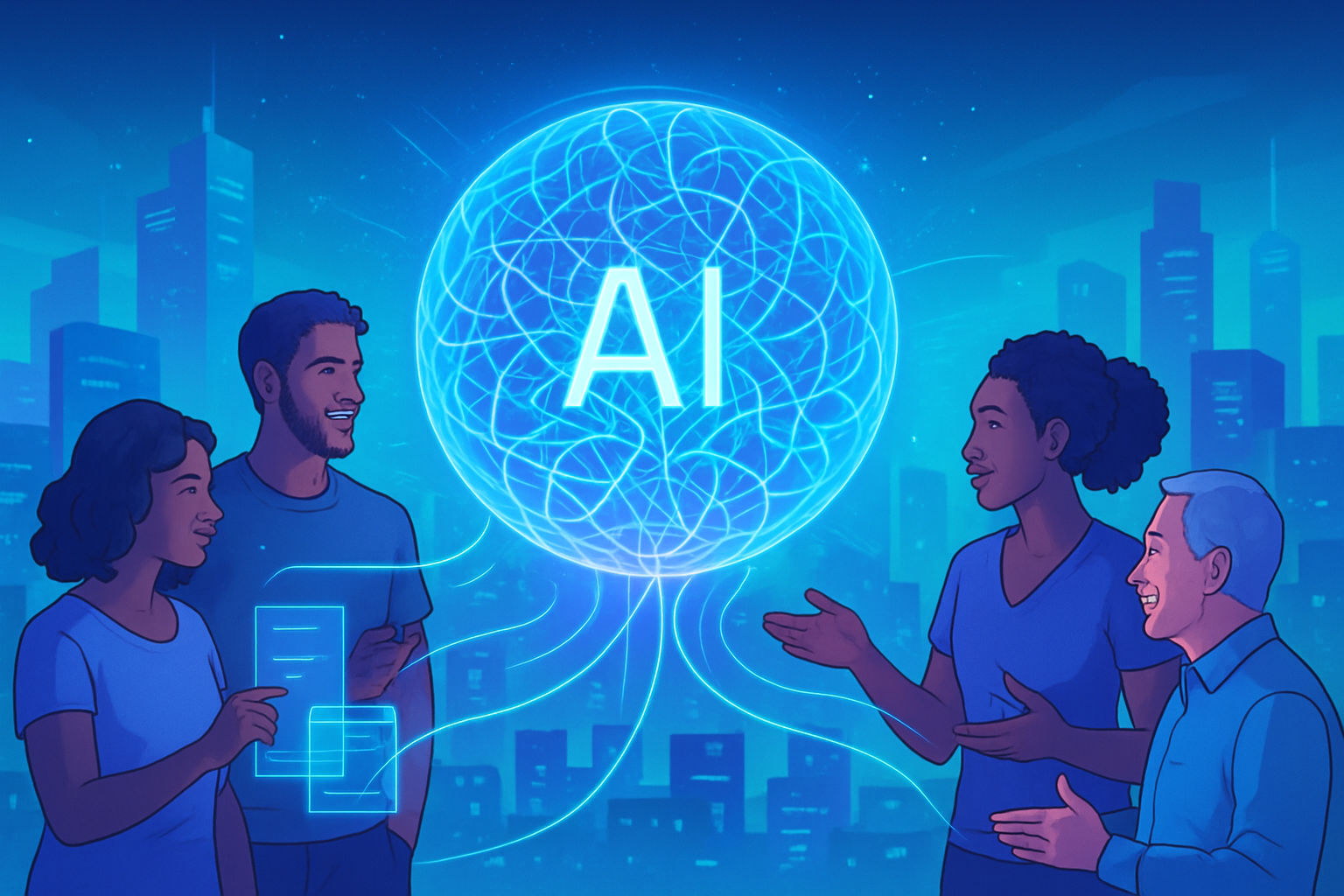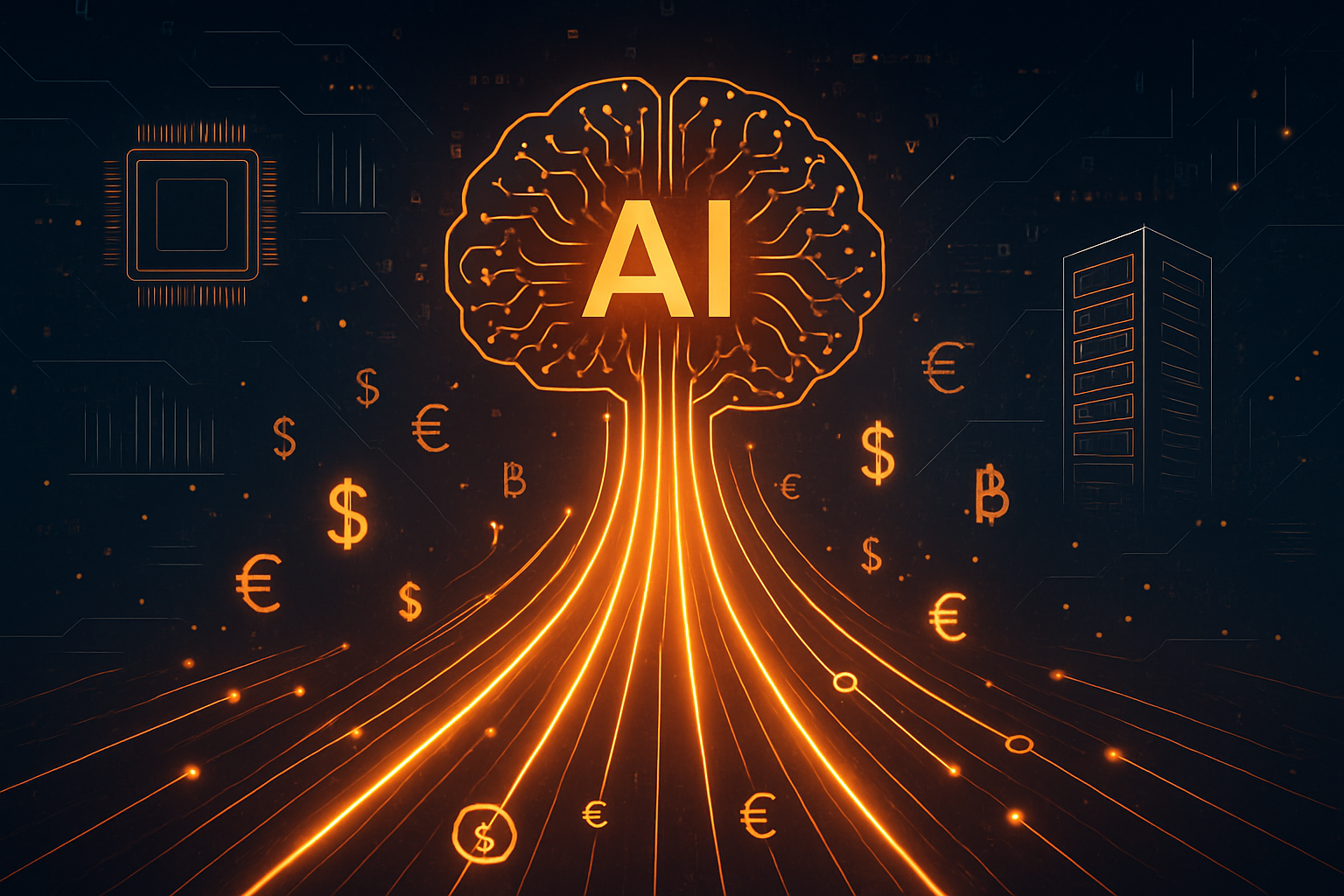Toronto, Canada – October 16, 2025 – Radical Ventures, a leading venture capital firm singularly focused on artificial intelligence, has announced the final close of a new $650 million USD fund dedicated to investing in early-stage AI companies globally. This substantial capital injection positions Radical Ventures among the largest early-stage AI investors worldwide and arrives at a pivotal moment when AI continues to dominate venture capital activity. Investors are increasingly seeking to back the next generation of disruptive AI startups from their inception, solidifying a trend of robust capital deployment into foundational AI technologies.
The new $650 million fund, representing Radical Ventures' fourth dedicated to early-stage AI and sixth overall, is poised to immediately empower promising companies leveraging AI across science, infrastructure, and enterprise innovation. Its closing underscores a vibrant and rapidly expanding AI investment landscape, where AI deals constituted a remarkable 63.3% of total funds raised in private technology companies through September 2025. While headline-grabbing multi-billion-dollar rounds for late-stage AI giants frequently capture attention, the bulk of AI funding activity is increasingly concentrated in early-stage investments, such as Seed and Series A rounds. This strategic focus on early-stage companies, deemed a "safe option" due to relatively controllable risks, highlights a broader trend of sustained investor confidence and robust capital deployment in the AI sector, which secured over $100 billion in global venture capital in 2024 alone. Backed by prominent institutional investors, Radical Ventures is set to fuel the development of transformative AI applications both domestically and internationally.
Radical Ventures' Strategic Deep Dive into AI's Foundations
Radical Ventures' $650 million USD fund (approximately $907 million CAD) is backed by prominent institutional investors, including a $75 million USD contribution from the Canada Pension Plan Investment Board (CPPIB). CPPIB's total investment across Radical Ventures' funds since 2019 now amounts to $280 million USD. While other limited partners (LPs) were not disclosed, a Radical partner stated they include large institutional investors, pension funds, and endowments. This new fund replaces a previously announced $550 million USD fund from 2023, demonstrating an increased appetite for early-stage AI investment.
The firm's core investment strategy revolves around backing early-stage companies that are leveraging AI to transform various industries. The fund will focus on deploying capital into startups utilizing artificial intelligence in critical areas such as science, infrastructure, and enterprise innovation. Radical Ventures' overarching mission is to partner with founders who understand the transformative power of AI to shape how we live, work, and play, investing primarily in companies that leverage AI, supporting both Canadian and international startups.
This new $650 million fund marks Radical Ventures' fourth early-stage specific fund and its sixth fund overall. It specifically replaces the $550 million USD fund launched in 2023. Notably, the firm also launched a separate $800 million USD growth-stage AI fund in August 2024, indicating a clear segmentation in their investment approach between early-stage and growth-stage companies. Radical Ventures has been focused on the AI space since its inception in 2017, long before the recent surge in popular interest in generative AI. Their prior funds, such as Fund I, focused on pre-seed and seed investments, while Fund II concentrated primarily on Series A stage investments with the ability to continue through growth stages. This new fund continues their dedication to early-stage AI, building on their established expertise.
The fund's explicit focus on early-stage AI startups underscores Radical Ventures' belief in the foundational impact of AI technology. The firm aims to invest in companies that are not only building core AI models but also those developing niche applications on top of these models. Radical Ventures has a strong track record of backing leading AI companies, with a portfolio that includes prominent Canadian AI startups like Cohere (a developer of large language models), Waabi (an autonomous driving company), and Xanadu (a quantum computing firm). The firm maintains a transatlantic presence with offices in Toronto, London, and San Francisco, demonstrating its global reach while retaining deep ties to Canada's AI ecosystem. Jordan Jacobs, co-founder and managing partner at Radical Ventures, has articulated a strong vision for AI, stating, "AI will eat all software over the next decade" and that "every business will end up using this [generative AI technology], either directly or via third-party software that is incorporating it." He also noted, "AI is entering a new phase — one defined by real-world application and value creation," and that their mission is to back the founders building that future. The firm's partners and advisors include respected AI luminaries such as Geoffrey Hinton (often called the "godfather of AI") and ImageNet project founder Fei-Fei Li, signifying a strong connection to cutting-edge AI research and development.
Reshaping the AI Battleground: Impact on Startups and Tech Giants
Radical Ventures' substantial capital injection into the artificial intelligence (AI) ecosystem is poised to profoundly impact various AI companies, tech giants, and startups, leading to intensified competition, potential market disruptions, and strategic shifts in positioning. The primary beneficiaries of the $650 million early-stage fund are AI startups, particularly those in Seed, Series A, and Series B stages. This capital provides essential resources for research and development, scaling operations, and expanding market reach. Radical Ventures focuses on companies that apply deep technology to transform massive industries, with a strong emphasis on machine learning and AI.
Notable existing portfolio companies that stand to benefit further or have already received significant backing include Cohere, a large language model developer; Waabi, an autonomous driving company; Xanadu, a quantum computing firm; Aspect Biosystems, focused on biotechnology; ClimateAi, developing an enterprise climate planning platform; Signal1, providing real-time insights to healthcare providers; Unlearn.AI, accelerating clinical trials; Writer, an AI-powered text data analytics platform; and You.com, an AI-enabled private search engine. The fund's "AI Eats Software" thesis suggests a strategic advantage for AI-first companies, ensuring investments are directed towards ventures that fundamentally integrate AI into their core offerings, positioning them for long-term impact across industries such as healthcare, transportation, financial services, and smart cities.
The impact on tech giants like Alphabet Inc. (NASDAQ: GOOGL), Microsoft (NASDAQ: MSFT), Amazon (NASDAQ: AMZN), and Meta Platforms (NASDAQ: META) is multifaceted. While not direct beneficiaries of Radical Ventures' investments, these companies operate within a dynamic AI ecosystem where successful startups can become either valuable acquisition targets or formidable competitors. Radical Ventures' funding fuels innovation that could lead to advancements that tech giants seek to acquire to bolster their own AI capabilities or integrate into their extensive product portfolios. Conversely, well-funded startups in areas like large language models (e.g., Cohere) directly challenge the core offerings of established AI labs and tech giants. The presence of such significant venture capital funds also validates the broader AI market, potentially encouraging further R&D and strategic investments from tech giants. The infusion of $650 million into early-stage AI intensifies the competitive landscape by increasing competition from startups, exacerbating talent acquisition wars, and putting strategic acquisition pressure on major players.
Potential disruption to existing products or services is significant. AI-powered platforms like Cohere could disrupt traditional enterprise software providers. Waabi's advancements in autonomous driving could revolutionize logistics and personal mobility. Investments in companies like Aspect Biosystems, Signal1, and Unlearn.AI promise to disrupt traditional medical research, diagnostics, and treatment. ClimateAi's platform could disrupt industries reliant on traditional climate risk assessment. These disruptions stem from the fundamental shift towards AI-native solutions that leverage deep learning and machine intelligence to offer superior efficiency, personalization, and capabilities compared to legacy systems. The fund will contribute to several shifts in the AI ecosystem, including reinforced North American AI leadership, the rise of specialized AI verticals, an emphasis on defensible AI, and an evolving venture capital landscape increasingly leveraging AI for its own investment decisions.
AI's New Frontier: Broader Implications and Historical Context
Radical Ventures' recent close of a $650 million fund for early-stage artificial intelligence (AI) companies marks a significant development in the rapidly evolving AI investment landscape. This fund, bringing Radical Ventures' total assets under management to approximately $1.8 billion across its various funds, underscores a robust and sustained investor confidence in nascent AI technologies and their potential to revolutionize industries. The fund's focus on early-stage innovation is crucial for nurturing foundational AI research and innovative applications at their nascent stages, providing critical capital when companies are most vulnerable. Their strategic industry impact is evident in their aim to back founders leveraging AI to create transformative solutions across diverse sectors, including healthcare, transportation, financial services, biotechnology, and climate tech. The strong institutional backing, including from the Canada Pension Plan Investment Board (CPPIB), TD Bank Group, and the Public Sector Pension Investment Board (PSP Investments), lends considerable credibility and stability, signaling deep confidence in the long-term prospects of AI.
The AI funding landscape is currently experiencing unprecedented growth and intense activity. Global private AI investment reached a record high of $252.3 billion in 2024, demonstrating a 44.5% increase in private investment. Specifically, generative AI has been a major driver, with private investment soaring to $33.9 billion in 2024, an 18.7% increase from 2023, and now accounting for over 20% of all AI-related private investment. This resilient growth, soaring deal sizes, and dual focus on infrastructure and applications define the current landscape. Investments are pouring into both AI infrastructure (e.g., specialized chips, data centers) and "applied AI" solutions. Cross-industry integration is rapid, and early-stage AI investment remains robust, ensuring a pipeline of future AI innovators.
The overall impacts of such investments include accelerated innovation and economic growth, with AI projected to contribute substantially to global GDP. Industry transformation is underway, and AI innovations exhibit substantial "knowledge spillovers." However, potential concerns include a bubble risk and valuation concerns, with companies commanding high valuations despite limited revenue. High burn rates, particularly for foundational model developers, pose a risk, as do the uncertainties of predicting long-term winners in a rapidly evolving field. Ethical and regulatory challenges, including data privacy and algorithmic bias, also remain significant concerns.
The current AI investment surge draws parallels and contrasts with historical periods of technological breakthroughs. While echoing the early enthusiasm of the 1950s-1970s and the expert systems boom of the 1980s, the scale and breadth of today's investment, particularly post-2017 breakthroughs like the Transformer architecture and generative AI (notably ChatGPT), are unprecedented. Unlike the dot-com bubble, where many companies had vague business models, current AI advancements are demonstrating real-time productivity gains and significant revenue potential. Radical Ventures' $650 million fund is a key indicator of the sustained and aggressive investment in early-stage AI, reflecting the immense confidence in AI's transformative potential.
The Horizon of AI: Future Applications and Looming Challenges
Increased early-stage AI funding, exemplified by venture capital firms like Radical Ventures, is profoundly shaping the trajectory of artificial intelligence, driving both rapid advancements and significant challenges. In the near term (1-5 years), increased funding is accelerating the maturation and deployment of existing AI technologies and fostering new, practical applications. This includes enhanced automation and efficiency, smarter software development tools (with generative AI handling up to 30% of code), personalized experiences in retail and education, and significant advancements in healthcare through predictive diagnostics and robot-assisted surgery. AI will also play a crucial role in sustainability solutions, advanced cybersecurity, and the rise of "AI agents" capable of autonomously handling routine inquiries and generating first drafts of code.
Looking further ahead (beyond 5 years), increased early-stage funding is laying the groundwork for more transformative and potentially disruptive AI developments. The evolution towards multimodal AI, capable of processing various data types, and AI with spatial intelligence will enable AI to comprehend the real world more effectively. AI is expected to contribute to a more circular and efficient economy, deeply integrate into infrastructure through IoT, and enable a wide range of new innovations in the physical world through autonomous systems. Increasingly powerful general-purpose AI models show promise in accelerating scientific discovery, and a predicted scarcity of human-generated data for training models by 2026 will drive exploration into synthetic data generation and novel data sources.
Potential new use cases on the horizon are diverse, spanning AI in climate tech (e.g., ClimateAi), drug discovery and personalized medicine (e.g., Xaira Therapeutics, which secured a $1 billion Series A), robotics in specialized industries, unlocking unstructured data (e.g., Hebbia), more affordable and sustainable construction (e.g., Promise Robotics), and real-time insights for critical sectors (e.g., Signal1).
Despite the optimistic outlook and significant investments, several key challenges need to be addressed for AI's sustained growth. Ethical and bias concerns remain paramount, requiring robust frameworks for transparency and accountability. Regulatory lag, with the rapid pace of AI advancement outpacing policy development, creates "grey areas" and potential ethical/legal oversights. Privacy and security risks, including AI-powered cyber threats and deepfake technology, pose significant challenges. The decentralized nature of AI development makes uniform regulation difficult. Economic and competitive pressures drive nations into a race for AI dominance, potentially hindering strict regulations. Job displacement due to automation necessitates workforce reskilling. Computational power and energy consumption of large AI models require massive investments in infrastructure and raise environmental concerns. Finally, "AI-washing" and the distinction between hype and substance remain a challenge for investors.
Experts anticipate a future where AI is deeply embedded across all facets of society and economy. Jordan Jacobs of Radical Ventures predicts that "AI will eat all software over the next decade," implying universal AI integration. AI is seen as a core business strategy, with nearly half of technology leaders reporting full integration by October 2024. Productivity and economic growth are expected to surge, with PwC estimating a 4.4% GDP increase by 2030. The future will likely see a shift towards both open-source large-scale models and smaller, more efficient models. Agentic AI systems are expected to become central to managing workflows by 2034. A focus on responsible AI practices will be crucial for ROI, alongside continued massive investment in AI infrastructure. Beyond business, experts believe AI has significant potential for social good, addressing global challenges like climate change and medical advancements.
A Defining Moment for AI Investment: The Road Ahead
Radical Ventures' substantial new $650 million fund marks a defining moment in the history of artificial intelligence investment, signaling a strategic pivot towards practical, value-driven applications and sustainable growth within the AI ecosystem. This significant capital infusion, alongside an earlier $800 million growth fund, positions Radical Ventures as a formidable player, accelerating innovation from nascent ideas to scaled solutions. The fund's focus on early-stage AI, particularly in areas like science, infrastructure, and enterprise, underscores a mature understanding that foundational innovation is crucial for long-term impact, moving beyond the initial hype of generative AI to tangible, real-world value creation.
This development holds immense significance in AI history, reinforcing the technology's emergence as a distinct and robust asset class. It reflects enduring institutional confidence in AI's transformative potential, even amidst broader market fluctuations, and solidifies Canada's growing prominence in the global AI landscape. The current era of AI investment, characterized by record-high funding and demonstrable breakthroughs, is often compared to the dot-com era, yet proponents argue that today's AI has a more immediate and tangible impact across industries. By concentrating on early-stage investments, Radical Ventures is actively fueling the foundational innovation and disruption that will define the next waves of AI development, promising accelerated technological advancement and economic transformation.
The long-term impact of such substantial early-stage investments is profound. Capital directed towards nascent AI companies is critical for nurturing groundbreaking innovations that may not offer immediate commercial returns but are vital for future technological breakthroughs. AI is projected to generate trillions of dollars in value and significantly boost global labor productivity, making early investments a cornerstone for this long-term economic transformation. Sustainable success, however, will depend on identifying companies that can translate technological prowess into viable business models and demonstrable profitability. This era also marks an evolution within venture capital itself, with firms increasingly leveraging AI-driven tools for enhanced due diligence, more efficient deal sourcing, and sophisticated portfolio management, leading to data-informed investment decisions.
In the coming weeks and months, several key trends will shape the AI funding and innovation landscape. Expect intensified scrutiny on commercialization, with investors demanding clear evidence of revenue generation and sustainable business models. The rise of verticalized AI solutions, tailored to specific industries, will become more prominent. Continued strong investment in foundational infrastructure, developer tools, and specialized hardware will be critical. Evolving regulatory and ethical frameworks will push companies to prioritize responsible AI development and compliance. Public-private collaborations will augment AI funding and strategies, and the AI IPO market may present significant opportunities for well-positioned companies. Furthermore, anticipate an increase in strategic acquisitions and consolidation as the market matures, alongside continued breakthroughs in agentic and multimodal AI. Radical Ventures' substantial new fund is not just a financial milestone; it is a strong indicator of the continued maturation of the AI industry, signaling a strategic pivot towards practical, value-driven applications and sustainable growth. The coming months will reveal how these investments translate into tangible innovations and shape the next chapter of the AI revolution.
This content is intended for informational purposes only and represents analysis of current AI developments.
TokenRing AI delivers enterprise-grade solutions for multi-agent AI workflow orchestration, AI-powered development tools, and seamless remote collaboration platforms.
For more information, visit https://www.tokenring.ai/.




